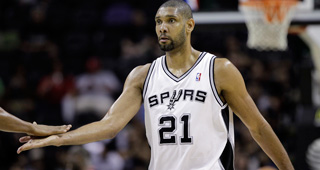A lot has happened to Stephen Jackson since he left the San Antonio Spurs after the 2003 season. He was Public Enemy No. 1 after the “Malice in the Palace” before reinventing himself as “Captain Jack” for the “We Believe” Warriors and being on the scene for the first playoff appearance in the history of the Charlotte Bobcats.
Yet when he came back to San Antonio in 2012, it was as if nothing had ever changed. Tim Duncan, Tony Parker and Manu Ginobili were still playing and Gregg Popovich was still roaming the sidelines. Over the last decade, the Spurs have seemingly existed outside of time, an unchanging rock amidst the constant stream of player movement and coaching changes that is the modern NBA.
But while the faces have stayed the same, the bodies underneath them have not. Duncan, Ginobili and Parker have each put over 750 NBA regular season, international and playoff games on their knees. And while they used to win with suffocating defense, age has forced them to become a jump-shooting team that depends on ball movement and superior offensive execution to win.
When DeAndre Jordan soared above the rim for an alley-oop late in the first quarter of Game 2, Duncan could only watch helplessly. But on the other end of the court, with Jordan right in his jersey and daring him to use the speed he no longer had, he put him through the spin cycle: jab-step, jab-step, dribble into a fade-away. Then, once he established the step-back jumper, he spun into the lane for a running hook.
It was almost effortless: moves that would have worked as well as 26 or 46 as they do at 36. Duncan’s mastery of the fundamentals has allowed him to remain effective long after his athleticism has left him. But, in his prime, his combination of skill and athleticism made him one of the top ten players of all-time.
With Duncan in the middle, the Spurs defense was ranked third in 2003, first in 2005 and second in 2007. In 2012, it was ranked 10th.
And over the last four seasons, their interior defense has repeatedly failed them in the playoffs. With Duncan no longer capable of playing above the rim, and no elite defensive big man capable of stepping up, they had no answer for Pau Gasol (2008), Dirk Nowitzki (2009), Amar'e Stoudemire (2010) and Zach Randolph (2011).
In 2012, they've finally moved the duo of Matt Bonner and DeJuan Blair to the end of the bench, with Tiago Splitter and Boris Diaw at least able to hold their own defensively next to Duncan. More importantly, the bracket out West has bounced their way, as they will likely avoid the two teams (Memphis and the Lakers) with the personnel who can exploit their frontcourt defense.
The Spurs can't run with either member of the Clippers' frontline, but neither Jordan nor Blake Griffin is polished enough to consistently score with their back to the basket. And after feasting on a turnover prone Memphis team in a first-round series that was as much barroom brawl as it was basketball, the Clippers' defense hasn't been disciplined enough to stay in front of an offense that crisply moves the ball around the floor for the entire 24 seconds.
But after tearing through a Utah Jazz team a year ahead of schedule in the first round and the Clippers in the second, they will likely face a franchise built in their image in the Western Conference Finals. Oklahoma City, a small-market club with a smart front office who combined luck in the lottery with the ability to find elite players deep in the first round, is the first team they'll face with the athleticism and skill level to test their defense.
When San Antonio was last winning championships, they had a prime Tim Duncan. In 2012, at the tail end of his career, a final title would be an unlikely and remarkable accomplishment.

Jonathan Tjarks wrote on the NBA for RealGM from 2011-2016 before joining The Ringer.
Follow @JonathanTjarks on Twitter.


